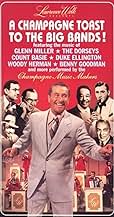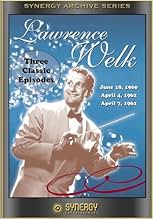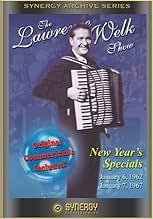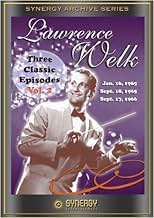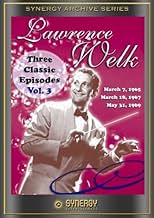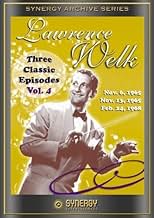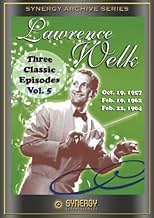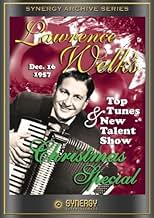Ajouter une intrigue dans votre langueOne of the most successful and fondly-remembered shows in TV history, "The Lawrence Welk Show" featured musical numbers and skits, with host Welk leading the band.One of the most successful and fondly-remembered shows in TV history, "The Lawrence Welk Show" featured musical numbers and skits, with host Welk leading the band.One of the most successful and fondly-remembered shows in TV history, "The Lawrence Welk Show" featured musical numbers and skits, with host Welk leading the band.
- Nommé pour 1 Primetime Emmy
- 1 nomination au total
Parcourir les épisodes
Avis à la une
I first saw this show in my grandparents' house in Binghamton, NY in the 1960s, and enjoyed The Lennon Sisters. This show was so fun to watch! When I got hooked on the show again in Texas in 1996, I took a liking to the peppery singer Bob Lido.
Perhaps the show seemed like old hat in 1974. However, when it ran on ABC from 1955 to 1971, it really reflected the tastes of much of Middle America, to which I belonged to. The 1960s did not just belong to the Flower Children; it belonged just as much to those who liked the performers on this show (as well as other shows, such as The F.B.I.). And I condemn no side; I am a Green Party type who likes this sort of show. I especially like the older episodes, and am fond of Alice Lon.
This show should be praised for preserving big band music at a time when it had fallen out of favor. And so many of the performers should be recognized for their efforts. I am sorry Bob Lido is gone, but at least Dick Dale, Anacani, Ken Delo and--yes--Joe Feeney are still around to provide great performances. I also enjoy Bobby Burgess, Mary Lou Metzger and the others as well, too.
May this show keep running on PBS for many years to come!!
Perhaps the show seemed like old hat in 1974. However, when it ran on ABC from 1955 to 1971, it really reflected the tastes of much of Middle America, to which I belonged to. The 1960s did not just belong to the Flower Children; it belonged just as much to those who liked the performers on this show (as well as other shows, such as The F.B.I.). And I condemn no side; I am a Green Party type who likes this sort of show. I especially like the older episodes, and am fond of Alice Lon.
This show should be praised for preserving big band music at a time when it had fallen out of favor. And so many of the performers should be recognized for their efforts. I am sorry Bob Lido is gone, but at least Dick Dale, Anacani, Ken Delo and--yes--Joe Feeney are still around to provide great performances. I also enjoy Bobby Burgess, Mary Lou Metzger and the others as well, too.
May this show keep running on PBS for many years to come!!
I've been a drummer since 1971. The musicians are first class. And contrary to another reviewer,the music and swing are NOT watered down. Lawrence Welk indeed was a fine musician. He made quite a living playing the accordion when people were lucky to have a crystal set to listen to the radio.
If there can be any complaint about the music, one must realize that the audio recordings of TV shows of this era were not as widely dynamic or in stereophonic sound. Most TV sets of the era were pretty low fi in terms of sound.
IF there was one episode of the show that you could use to introduce people to the greatness of the show, I would suggest: Strike up the Band from 1964. Great, Great dancing by Barbara Boylan and Bobby Burgess. A perfect solo by Bob Ralston. And talk about swing? How about, "Slipped Disc" in the style of Benny Goodman? A great solo by Norman Bailey on trumpet of the great, "Sugar Blues" in the style of Clyde McCoy.
There are even more great tunes by the lennon sisters.
The Black and White quality is sharp as a tack.
Lawrence Welk single handedly kept big bands alive along with the Great American Song Book.
Is it corny? Well, corn is good for you! But its only corny if you are one of those guys who think you are too cool for school.
Top notch musicians. I mean they could play any style and go between styles in the same show as easily as you can imagine.
I've heard great Dixieland music, followed by popular music of the day, swing from the past and folk songs all in the same episode. All played very well.
Anyone who thinks otherwise might not know too much about music. Go to the shows of the late 50's and early 60's and you can see some GREAT electric guitar by neil lavang and the great buddy merril.
A leading exponent of traditional jazz/dixieland trumpet playing was the great Richard Cathcart. He was so good he did the trumpet work in the fine film, "Pete Kelly's Blues".
And then there was Bob Havens. Talk about excellent trombone players, he studied with the famous Jack Teagarden.
There were more than 1000 episodes of this show made. I only wish they were all available on DVD. I would pay top dollar for all 1000 eps!
What's wrong with this show? Nothing. Not a thing.
Somehow, this was pigeonholed as nothing but a polka show. Believe me they do polkas , but there is so much more. And they make the polkas lots of fun too.
Its on PBS now on almost 300 stations throughout the USA. Check your local listings. Some big fancy towns think they are above it all and you might not find it in some towns.
This show has been on as long as "I Love Lucy". And since there are MORE shows than "I Love Lucy" there is that much more entertainment.
I just wish I could personally tell all the performers what I really think of them.
to Barbara Boylan, the best looking girl ever on the show, you are a fantastic dancer and you are my favorite.
To Norman Bailey, what a great master of the trumpet, esp the mute!
To John Klein, the drummer, you did it all with such taste and dignity.
There isn't anyone on this show that I wouldn't be lucky to meet in person. God Bless you all!
If there can be any complaint about the music, one must realize that the audio recordings of TV shows of this era were not as widely dynamic or in stereophonic sound. Most TV sets of the era were pretty low fi in terms of sound.
IF there was one episode of the show that you could use to introduce people to the greatness of the show, I would suggest: Strike up the Band from 1964. Great, Great dancing by Barbara Boylan and Bobby Burgess. A perfect solo by Bob Ralston. And talk about swing? How about, "Slipped Disc" in the style of Benny Goodman? A great solo by Norman Bailey on trumpet of the great, "Sugar Blues" in the style of Clyde McCoy.
There are even more great tunes by the lennon sisters.
The Black and White quality is sharp as a tack.
Lawrence Welk single handedly kept big bands alive along with the Great American Song Book.
Is it corny? Well, corn is good for you! But its only corny if you are one of those guys who think you are too cool for school.
Top notch musicians. I mean they could play any style and go between styles in the same show as easily as you can imagine.
I've heard great Dixieland music, followed by popular music of the day, swing from the past and folk songs all in the same episode. All played very well.
Anyone who thinks otherwise might not know too much about music. Go to the shows of the late 50's and early 60's and you can see some GREAT electric guitar by neil lavang and the great buddy merril.
A leading exponent of traditional jazz/dixieland trumpet playing was the great Richard Cathcart. He was so good he did the trumpet work in the fine film, "Pete Kelly's Blues".
And then there was Bob Havens. Talk about excellent trombone players, he studied with the famous Jack Teagarden.
There were more than 1000 episodes of this show made. I only wish they were all available on DVD. I would pay top dollar for all 1000 eps!
What's wrong with this show? Nothing. Not a thing.
Somehow, this was pigeonholed as nothing but a polka show. Believe me they do polkas , but there is so much more. And they make the polkas lots of fun too.
Its on PBS now on almost 300 stations throughout the USA. Check your local listings. Some big fancy towns think they are above it all and you might not find it in some towns.
This show has been on as long as "I Love Lucy". And since there are MORE shows than "I Love Lucy" there is that much more entertainment.
I just wish I could personally tell all the performers what I really think of them.
to Barbara Boylan, the best looking girl ever on the show, you are a fantastic dancer and you are my favorite.
To Norman Bailey, what a great master of the trumpet, esp the mute!
To John Klein, the drummer, you did it all with such taste and dignity.
There isn't anyone on this show that I wouldn't be lucky to meet in person. God Bless you all!
Having lived for some time in southwestern Missouri, and having had many occasions to be in Branson - personally and on business - I was there when the Welk Resort was constructed (by Lawrence Welk, Jr.). The facility is away from the cacophony of noise from Branson's "main drag," has one of the finer theaters, as well as entertainment in the dining area.
We stayed there one week with friends, and it's the only hotel I've ever seen where the registration card has a place to check "if you have heart problems."
Now living in Tulsa, our Oklahoma public television organization is the producer of the Welk Show programs regularly public TV.
People have criticized Welk's music as corny and unimaginative - but while the folksy manner of the host and most of the performers may have seemed a bit excessive at times, one must remember this orchestra spawned Pete Fountain, whom I have seen at Welk reunion shows, both on TV and live.
One of the finest albums I have has an eclectic group of numbers, all by Johnny Hodges with the Welk orchestra. Hodges, of course, before he went on his own, was simply Duke Ellington's lead sax player.
The shows provide a lot of nostalgia, whether one may have seen them originally, and whether or not the viewer is a great fan of Welk's music. The older ones are several decades old, and present a variety of music which was contemporary then and nostalgic now. The shows which, say, 30- or 40-years-ago were nostalgia pieces then, are even more so now. If you watch the originals and then view the periodic current/special event/reunion shows, it is interesting to view the aging process at work. {One caveat - sometimes watching "Champagne Lady" Norma Zimmer (and a few of others, occasionally) warrants diabetics ensuring an extra dosage of insulin is nearby.}
One also might pose the riddle: What television show - at the same time - had the most and fewest bald and/or gray-haired performers? The answer surely would be this show. It displays more comb-overs, dye jobs and toupees, per capita, than anywhere on the planet. It presents more examples than a "Hair Club" or "Sassoon" catalog ever could. It's fascinating to watch the camera pan the group, and imagine everyone sans the comb-overs, pieces, and Clairol. Just an amusing bonus to this entertaining show.
The programs overall fall within a 7* to 10* range, so 9* is appropriate.
We stayed there one week with friends, and it's the only hotel I've ever seen where the registration card has a place to check "if you have heart problems."
Now living in Tulsa, our Oklahoma public television organization is the producer of the Welk Show programs regularly public TV.
People have criticized Welk's music as corny and unimaginative - but while the folksy manner of the host and most of the performers may have seemed a bit excessive at times, one must remember this orchestra spawned Pete Fountain, whom I have seen at Welk reunion shows, both on TV and live.
One of the finest albums I have has an eclectic group of numbers, all by Johnny Hodges with the Welk orchestra. Hodges, of course, before he went on his own, was simply Duke Ellington's lead sax player.
The shows provide a lot of nostalgia, whether one may have seen them originally, and whether or not the viewer is a great fan of Welk's music. The older ones are several decades old, and present a variety of music which was contemporary then and nostalgic now. The shows which, say, 30- or 40-years-ago were nostalgia pieces then, are even more so now. If you watch the originals and then view the periodic current/special event/reunion shows, it is interesting to view the aging process at work. {One caveat - sometimes watching "Champagne Lady" Norma Zimmer (and a few of others, occasionally) warrants diabetics ensuring an extra dosage of insulin is nearby.}
One also might pose the riddle: What television show - at the same time - had the most and fewest bald and/or gray-haired performers? The answer surely would be this show. It displays more comb-overs, dye jobs and toupees, per capita, than anywhere on the planet. It presents more examples than a "Hair Club" or "Sassoon" catalog ever could. It's fascinating to watch the camera pan the group, and imagine everyone sans the comb-overs, pieces, and Clairol. Just an amusing bonus to this entertaining show.
The programs overall fall within a 7* to 10* range, so 9* is appropriate.
I used to be forced to watch this show every saturday night or else go to my room and read. My mother just had to see Lawrence'a Walk'a and his'a Cham'apayne'a Band'a. I always wondered why he talked so weird, turns out his folks were from Germany or some place so he picked up their accent. I couldn't stand the show back in the 50's, but now wish I could see some of the old re-runs. Welk had some good musicians and dancers, and they always put on a very professional show. However, I could not stand Joe Feeney, the Irish tenor. He was most assuredly not wunnerful'a, wunnerful'a.
After a few years on local television, Lawrence Welk continues to host his Saturday evening song and dance variety program before a national audience for another 27 years (1955-82).
Wholesome, nostalgic, quality presentation become the order of the day, as Lawrence Welk, with his thick Germanic accent, introduces his Orchestra, singers and dancers, and sometimes comedy sketches each week, usually taking time out for one instrumental number to welcome a string of lovely audience females to spin around the dance floor.
Episodes often spotlight one select theme, with an occasional tribute to a famous songwriter, as Jerome Kern, Henry Mancini, Johnny Mercer or Harry Warren, or a tribute to a music genre, as Swing Bands, Country & Western, Patriotic Songs, Hymns or Show Tunes, or a tribute to a holiday or season, colors, states, flowers... oh, just about anything healthy and wholesome, with fashionable costuming to suit the occasion.
Lovely soprano Norma Zimmer joins the cast as Welk's "Champagne Lady" near the end of 1960, and thankfully doesn't follow up on her plans for an early retirement, which is often discussed for more then two decades throughout the program's run.
Other recognizable singers who achieve fame for many fine performances upon "The Lawrence Welk Show" include Jimmy Roberts, Bob Ralston, Bob Lido, Joe Feeney, (Dianne, Peggy, Kathy and Janet) the Lennon Sisters, Guy Hovis and Ralna English, Gail Farrell, Dick Dale and Tom Netherton plus many orchestra members and other vocalists (although it may be considered a mixed bag of sorts in that regard).
Myron Floren, the "Happy Norwegian" accordionist, stands out from the band with his friendly perpetual smile, while capably accompanying the orchestra, while standing in a well-deserved spotlight of his very own.
Jo Ann Castle also performs before the spotlight with her dynamic piano arrangements, her instrument often decorated for every event, and even igniting in flames on occasion.
Arthur Duncan steps to the beat with his famous tap dancing routines during his weekly segments, as do Bobby Burgess and Cissy King with their range of meticulously-choreographed dances, ranging from Ballroom to Country. Bobby remains upon the program a bit longer than Cissy and, therefore, has other dance partners, but when it comes to performance, these three (Arthur, Bobby and Cissy) rank right up there with the best of the all-time greats.
So, this series lives up to its promises of quality entertainment, spanning the 1950's with the 1980's, and holds up quite well today in PBS rerun packages, which are introduced by "Lawrence Welk Show" alumni, who also offer interesting behind-the-scenes commentary in lieu of commercial breaks.
Wholesome, nostalgic, quality presentation become the order of the day, as Lawrence Welk, with his thick Germanic accent, introduces his Orchestra, singers and dancers, and sometimes comedy sketches each week, usually taking time out for one instrumental number to welcome a string of lovely audience females to spin around the dance floor.
Episodes often spotlight one select theme, with an occasional tribute to a famous songwriter, as Jerome Kern, Henry Mancini, Johnny Mercer or Harry Warren, or a tribute to a music genre, as Swing Bands, Country & Western, Patriotic Songs, Hymns or Show Tunes, or a tribute to a holiday or season, colors, states, flowers... oh, just about anything healthy and wholesome, with fashionable costuming to suit the occasion.
Lovely soprano Norma Zimmer joins the cast as Welk's "Champagne Lady" near the end of 1960, and thankfully doesn't follow up on her plans for an early retirement, which is often discussed for more then two decades throughout the program's run.
Other recognizable singers who achieve fame for many fine performances upon "The Lawrence Welk Show" include Jimmy Roberts, Bob Ralston, Bob Lido, Joe Feeney, (Dianne, Peggy, Kathy and Janet) the Lennon Sisters, Guy Hovis and Ralna English, Gail Farrell, Dick Dale and Tom Netherton plus many orchestra members and other vocalists (although it may be considered a mixed bag of sorts in that regard).
Myron Floren, the "Happy Norwegian" accordionist, stands out from the band with his friendly perpetual smile, while capably accompanying the orchestra, while standing in a well-deserved spotlight of his very own.
Jo Ann Castle also performs before the spotlight with her dynamic piano arrangements, her instrument often decorated for every event, and even igniting in flames on occasion.
Arthur Duncan steps to the beat with his famous tap dancing routines during his weekly segments, as do Bobby Burgess and Cissy King with their range of meticulously-choreographed dances, ranging from Ballroom to Country. Bobby remains upon the program a bit longer than Cissy and, therefore, has other dance partners, but when it comes to performance, these three (Arthur, Bobby and Cissy) rank right up there with the best of the all-time greats.
So, this series lives up to its promises of quality entertainment, spanning the 1950's with the 1980's, and holds up quite well today in PBS rerun packages, which are introduced by "Lawrence Welk Show" alumni, who also offer interesting behind-the-scenes commentary in lieu of commercial breaks.
Le saviez-vous
- AnecdotesFrom its move to network television in 1955 until the very early 1960s, the show's primary sponsor was Dodge. The Dodge name would be part of the set and during some performances, the shots would be framed so that the Dodge name would be unobstructed. As was common in the 1950s, the name of the primary sponsor would be part of the show's official title. During this period, this show's official title was "The Lawrence Welk Dodge Show."
- Citations
Lawrence Welk - Host: Wunnerful, Wunnerful.
- Versions alternativesWhen the show is shown in syndication on PBS, it contains color presentation clips filmed and hosted by surviving members of the Welk musical family. This is presumably done to pad the show out to the length it would be with commercial breaks.
- ConnexionsEdited into Commercial Entertainment Product (1992)
- Bandes originalesBubbles in the Wine
by Frank Loesser, Bob Calame, and Lawrence Welk
Paramount Music Corporation (ASCAP)
Meilleurs choix
Connectez-vous pour évaluer et suivre la liste de favoris afin de recevoir des recommandations personnalisées
- How many seasons does The Lawrence Welk Show have?Alimenté par Alexa
Détails
- Date de sortie
- Pays d’origine
- Langue
- Aussi connu sous le nom de
- The Lawrence Welk Show
- Lieux de tournage
- Sociétés de production
- Voir plus de crédits d'entreprise sur IMDbPro
- Durée
- 1h(60 min)
- Couleur
- Mixage
- Rapport de forme
- 1.33 : 1
Contribuer à cette page
Suggérer une modification ou ajouter du contenu manquant

